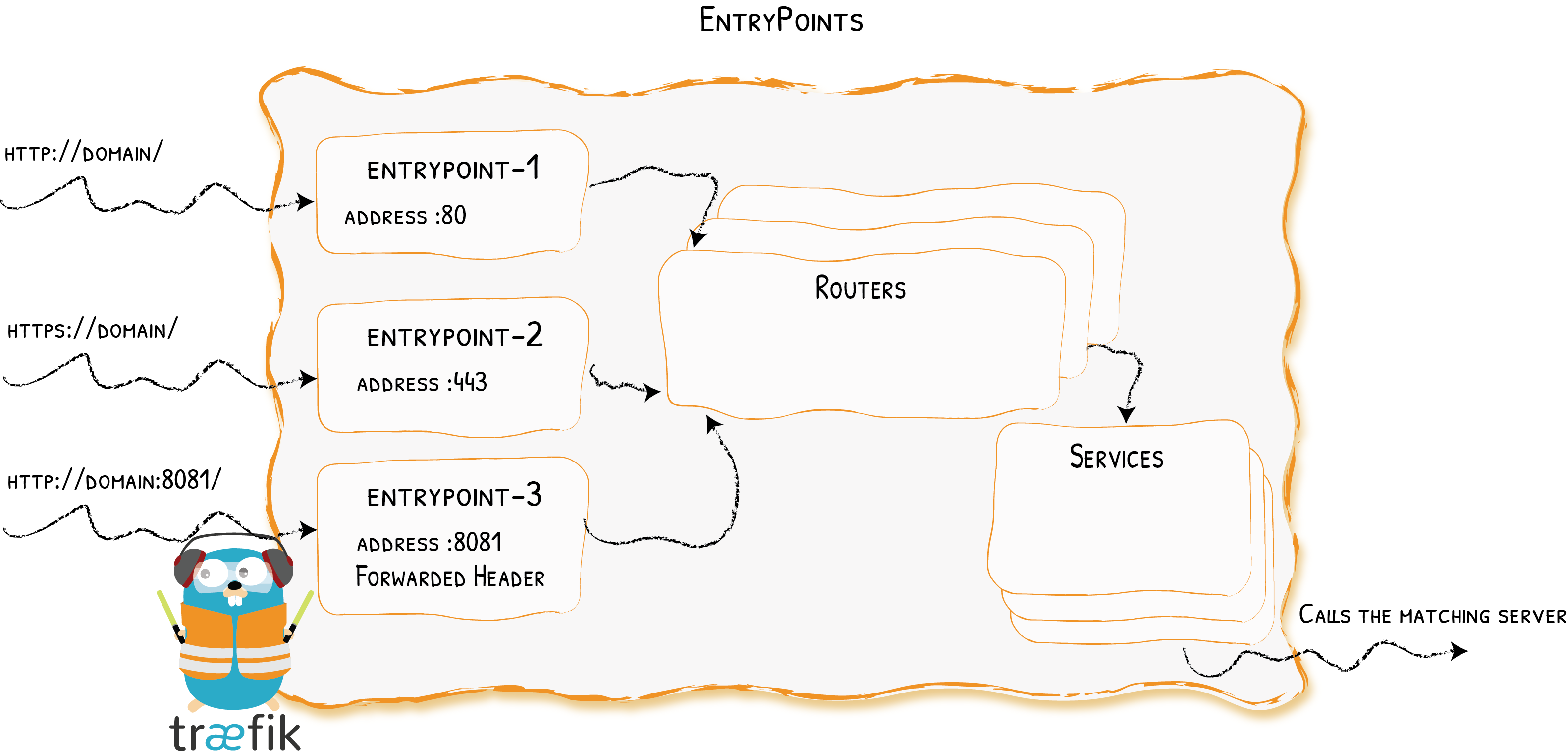4 KiB
EntryPoints
Opening Connections for Incoming Requests {: .subtitle }
EntryPoints are the network entry points into Traefik. They define the port which will receive the requests (whether HTTP or TCP).
Configuration Examples
??? example "Port 80 only"
```toml
[entryPoints]
[entryPoints.web]
address = ":80"
```
We define an `entrypoint` called `web` that will listen on port `80`.
??? example "Port 80 & 443"
```toml
[entryPoints]
[entryPoints.web]
address = ":80"
[entryPoints.web-secure]
address = ":443"
```
- Two entrypoints are defined: one called `web`, and the other called `web-secure`.
- `web` listens on port `80`, and `web-secure` on port `443`.
Configuration
General
EntryPoints are part of the static configuration. You can define them using a toml file, CLI arguments, or a key-value store.
See the complete reference for the list of available options:
[entryPoints]
[entryPoints.EntryPoint0]
Address = ":8888"
[entryPoints.EntryPoint0.Transport]
[entryPoints.EntryPoint0.Transport.LifeCycle]
RequestAcceptGraceTimeout = 42
GraceTimeOut = 42
[entryPoints.EntryPoint0.Transport.RespondingTimeouts]
ReadTimeout = 42
WriteTimeout = 42
IdleTimeout = 42
[entryPoints.EntryPoint0.ProxyProtocol]
Insecure = true
TrustedIPs = ["foobar", "foobar"]
[entryPoints.EntryPoint0.ForwardedHeaders]
Insecure = true
TrustedIPs = ["foobar", "foobar"]
--entryPoints.EntryPoint0.Address=:8888
--entryPoints.EntryPoint0.Transport.LifeCycle.RequestAcceptGraceTimeout=42
--entryPoints.EntryPoint0.Transport.LifeCycle.GraceTimeOut=42
--entryPoints.EntryPoint0.Transport.RespondingTimeouts.ReadTimeout=42
--entryPoints.EntryPoint0.Transport.RespondingTimeouts.WriteTimeout=42
--entryPoints.EntryPoint0.Transport.RespondingTimeouts.IdleTimeout=42
--entryPoints.EntryPoint0.ProxyProtocol.Insecure=true
--entryPoints.EntryPoint0.ProxyProtocol.TrustedIPs=foobar,foobar
--entryPoints.EntryPoint0.ForwardedHeaders.Insecure=true
--entryPoints.EntryPoint0.ForwardedHeaders.TrustedIPs=foobar,foobar
ProxyProtocol
Traefik supports ProxyProtocol.
??? example "Enabling Proxy Protocol with Trusted IPs"
```toml
[entryPoints]
[entryPoints.web]
address = ":80"
[entryPoints.web.proxyProtocol]
trustedIPs = ["127.0.0.1/32", "192.168.1.7"]
```
IPs in `trustedIPs` only will lead to remote client address replacement: Declare load-balancer IPs or CIDR range here.
??? example "Insecure Mode -- Testing Environment Only"
In a test environments, you can configure Traefik to trust every incoming connection.
Doing so, every remote client address will be replaced (`trustedIPs` won't have any effect)
```toml
[entryPoints]
[entryPoints.web]
address = ":80"
[entryPoints.web.proxyProtocol]
insecure = true
```
!!! warning "Queuing Traefik behind Another Load Balancer"
When queuing Traefik behind another load-balancer, make sure to configure Proxy Protocol on both sides.
Not doing so could introduce a security risk in your system (enabling request forgery).
Forwarded Header
You can configure Traefik to trust the forwarded headers information (X-Forwarded-*)
??? example "Trusting Forwarded Headers from specific IPs"
```toml
[entryPoints]
[entryPoints.web]
address = ":80"
[entryPoints.web.forwardedHeaders]
trustedIPs = ["127.0.0.1/32", "192.168.1.7"]
```
??? example "Insecure Mode -- Always Trusting Forwarded Headers"
```toml
[entryPoints]
[entryPoints.web]
address = ":80"
[entryPoints.web.forwardedHeaders]
insecure = true
```
